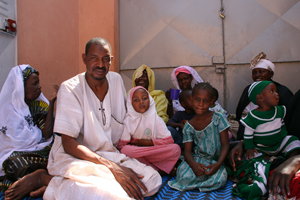
Caritas is helping families in Mali cover their basic needs by providing food, shelter and help with healthcare and school fees. Credit: Helen Blakesley/CRS
How did the conflict start?
Tuareg rebels led a rebellion in the north of Mali in January 2012 in a bid for independence. The Malian military staged a coup in March 2012 and Timbuktu, Gao and Kidal fell to armed groups. The rebels broke off peace talks at the beginning of January 2013 and subsequently took control of Konna and Diabali, about 400km from the capital, Bamako. One of their aims was to introduce Sharia Law. French troops launched an offensive in early January 2013 and are supported by African troops. They recaptured Konna, Diabli and other towns as well as the airport at Timbuktu.
What are the effects of the conflict on Malians?
The north has seen aerial bombardments and heavy fighting and before the that rebel invasion of towns. Many people have fled the unrest either further south or to neighbouring countries. The UN said there were over 200,000 internally displaced people in Mali by the end of January 2013. Over 150,000 Malians have fled to Mauritania, Burkina Faso and Niger.
What are the difficulties Malians are facing as a result of the conflict?
As rebels took hold of the north of the country, communities were cut off from help. People have been killed during the conflict, endured sexual violence, torture, have disappeared and child soldiers have been used. Food prices are high, not just because of the conflict, but also because a poor harvest in 2011 led to a food crisis in 2012. Over 500,000 people need help getting food in the north. Malnutrition rates are very high in some places.
What is Caritas doing?
The president of Caritas Mali, Archbishop Jean Zerbo of Bamako, has asked for a humanitarian corridor to be opened to help those who have found themselves cut off by the conflict. Caritas is helping families in Mali cover their basic needs by providing food, shelter and help with healthcare and school fees. The conflict has meant that for Caritas and other agencies it has been too dangerous to work in the north. Meanwhile, in Burkina Faso Caritas is helping refugees by providing them with fuel efficient stoves and training in environmental protection. Caritas Niger has been helping refugees over the past few months by giving out food, health kits and coal.
